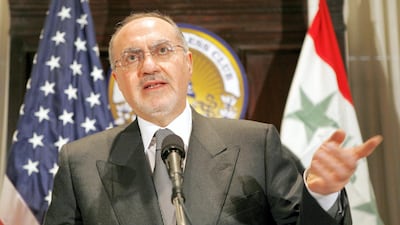In 2014, Iraqi historian and politician Ali Allawi, wrote: "What Iraq sorely needs is a transformational leader of Faisal's calibre."
He was referring to King Faisal I, the Arab statesman who ruled Iraq in the early 20th century. But could Mr Allawi – whose words came in a book on Faisal – be ready to step into his shoes to rule Iraq?
In the weeks since Iraq's elections, intrigue and speculation over who might be selected to run the next government has dominated. In the Arabic press, one familiar name from the past keeps reappearing – Mr Allawi.
The list headed by Shiite cleric Moqtada Al Sadr won the most votes in the May 12 contest, beating current Prime Minister Haider Al Abadi and other lists. Mr Al Sadr is now leading negotiations to form a government, but is not seeking the premiership for himself.
Following previous elections, backroom negotiations to form large, unwieldy coalitions have selected surprise compromise candidates. Mr Al Abadi was one such selection.
He was the preferred candidate of the United States before the election and may yet remain prime minister, despite his list finishing in a surprising third. Iran is also likely to play an active role in approving its neighbour's government. In Iraq's elections since the removal of dictator Saddam Hussein in 2003, potential prime ministers have had to receive at least tacit approval from Washington and Tehran.
Mr Allawi's credentials would make him a capable compromise candidate, some believe.
"Ali Allawi is someone who is well respected and well regarded by many. He has been writing for the past few years and has good thoughts on how to help fix the problems in Iraq," said Renad Mansour, a senior research fellow at London's Chatham House.
_______________
Read more:
Are Iraq's Communists on the rise again?
US and Iran wade in as talks begin on new Iraq government
Iraq's PM congratulates Moqtada Al Sadr on election performance
_______________
Baghdad-born Mr Allawi, 70, lived much of his life in exile in London. He comes from a prominent Shiite family, which fled Iraq after the 1958 coup that overthrew King Faisal II. Educated in Britain and America – including at the prestigious Massachusetts Institute of Technology – Mr Allawi later worked as a merchant banker and for the World Bank.
As the nephew of Iraqi opposition leader in exile Ahmed Chalabi, Mr Allawi remained an active opponent of Saddam. Mr Allawi returned to Iraq after four decades of exile in 2003 to help run the country, first as a minister of defence and trade in the Iraqi Governing Council Cabinet of 2003-04 and later as finance minister in the Transitional National Government of Iraq in 2005-06.
Living outside Baghdad’s fortified Green Zone, Mr Allawi survived two attempts on his life in which several of his aides were killed. He eventually left Iraqi politics disillusioned in 2006.
However, he did not leave public life and later wrote the first history by an Iraqi official of the chaos that followed the US-led invasion that toppled Saddam. In The Occupaton of Iraq, Mr Allawi placed much of the blame for Iraq's troubles on its new political class, which he has described as "avaricious" and a "mostly venal and incompetent bunch".
Lately clerical authorities in Najaf have praised Mr Allawi – who is not affiliated with any political parties – as a suitably independent candidate for prime minister, Saudi-owned Al Arabiya reports.
Mr Allawi did not run in the election and has not spoken publicly about returning to Iraqi politics.
But local news reports suggest that the second-placed Fatah list, led by Shiite militia leader Hadi Al Ameri, and the State of Law Coalition, led by former Prime Minister Nouri Al Maliki, are in favour of Mr Allawi’s nomination.
“It requires genuine vision and statesmanship to pull the Middle East from its death spiral,” Mr Allawi wrote in 2007. But while he has vision, analysts believe he remains a long shot.
The election results suggest that Iraqis are becoming hostile toward western-exiled politicians.
"People are trying to move away from the Green Zone elites and diaspora elites," said Mr Mansour. “It will be a surprise for someone like Ali Allawi, who spends most of his time outside of Iraq, to become prime minister.”

